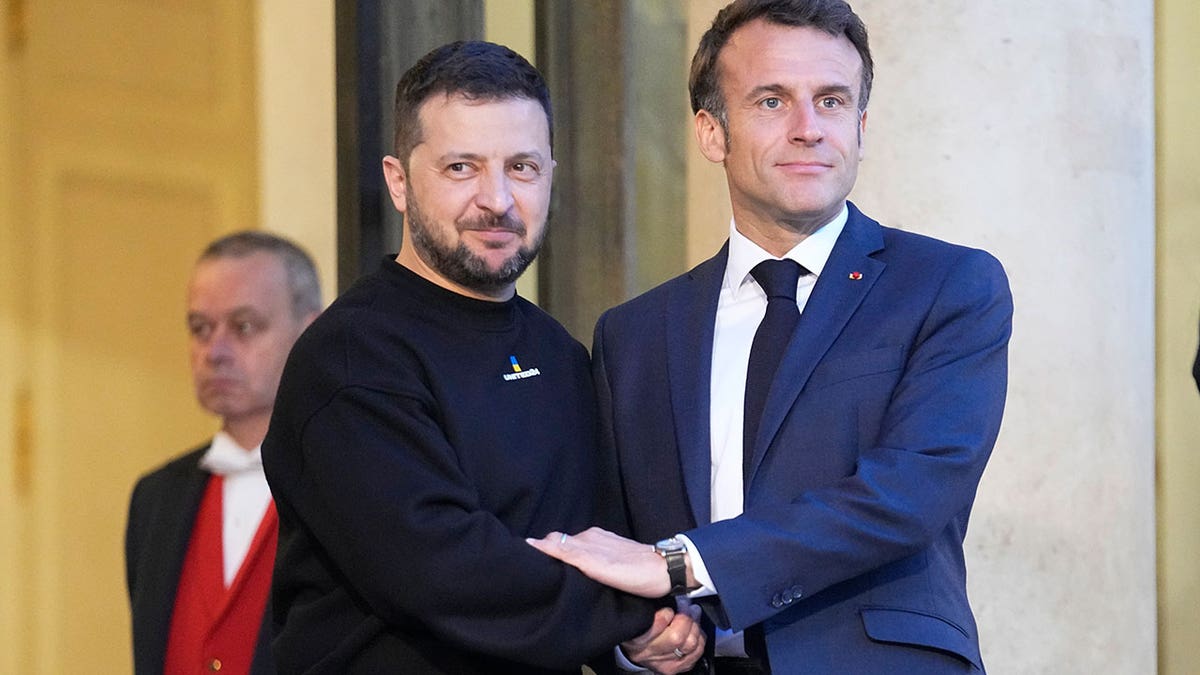Foreign aid package comes as Ukraine war enters third year of fighting
Fox News chief national security correspondent Jennifer Griffin breaks down the $95 billion foreign aid package approved by the Senate.
- French President Emmanuel Macron is expecte to sign a bilateral security agreement with Ukrainian President Volodymyr Zelenskyy in Paris on Friday.
- Macron previously mentioned negotiations for a bilateral deal similar to the one Ukraine made with the UK, covering a 10-year period.
- This marks Zelenskyy's third visit to Paris since Russia's invasion of Ukraine nearly two years ago, with previous visits in February and May 2023.
French President Emmanuel Macron will sign a bilateral security agreement with Ukrainian President Volodymyr Zelenskyy on Friday in Paris as part of a trip that will also go through Germany, the French presidency said in a statement.
It did not release specific details about the agreement, to be signed at the Elysee presidential palace.
Macron said earlier this year that France was negotiating a bilateral deal on the model the one Ukraine recently agreed with the United Kingdom, which covers 10 years.
ZELENSKYY TURNS TO EUROPE FOR AID AS TRUMP BASHES US FUNDING PACKAGE
This will be the third visit by Zelenskyy to Paris since Russia’s invasion of Ukraine almost two years ago, following those in February and May 2023, the statement said.

French President Emmanuel Macron, right, welcomes Ukrainian President Volodymyr Zelenskyy at the Elysee palace in Paris, on May 14, 2023. Macron is set to sign a bilateral security agreement with Zelenskyy on Feb. 16, 2024 in Paris as part of a trip to Germany and France. (AP Photo/Michel Euler, File)
The French presidency said the visit will be an opportunity for Macron "to reaffirm France’s determination to continue to provide unwavering support to Ukraine and the Ukrainian people, over the long term and with all its partners."
Both leaders will discuss the situation on the front line, Ukraine’s military, economic and humanitarian needs, as well as negotiations on the country's efforts to join the European Union, which France fully supports, the statement said.
ZELENSKYY WILL FACE 'RECKONING' WHEN WAR WITH RUSSIA ENDS, EXPERT SAYS
Ukraine's presidential office on Thursday said Zelenskyy will visit Germany, where he will meet with Chancellor Olaf Scholz, and France on Friday.
He will also participate the next day to the Munich Security Conference and will hold bilateral meetings on its sideline, including with U.S. Vice President Kamala Harris, Czech President Petr Pavel, Denmark Prime Minister Mette Frederiksen and the Netherlands Prime Minister Mark Rutte.









































